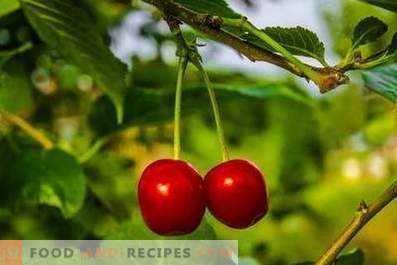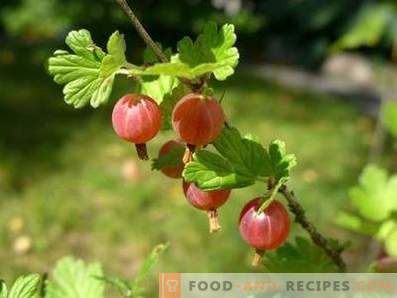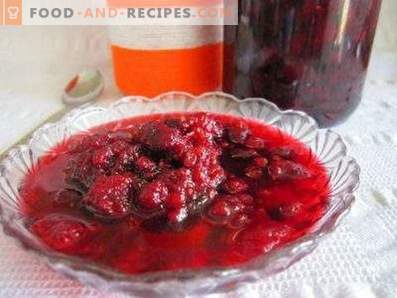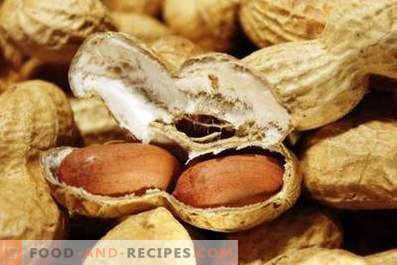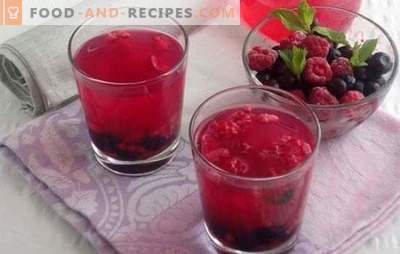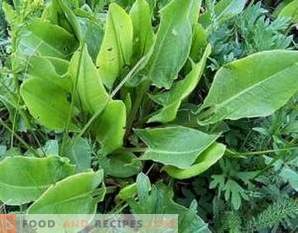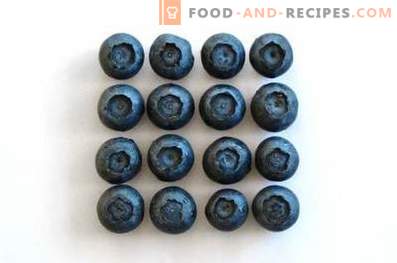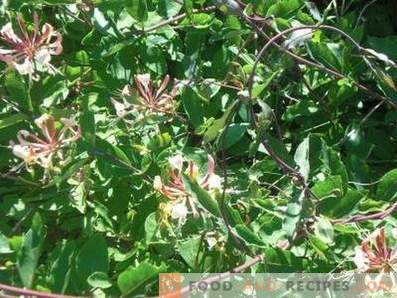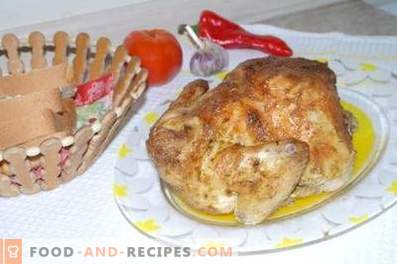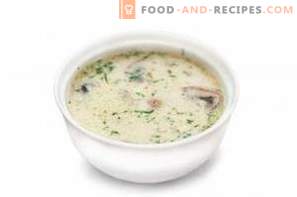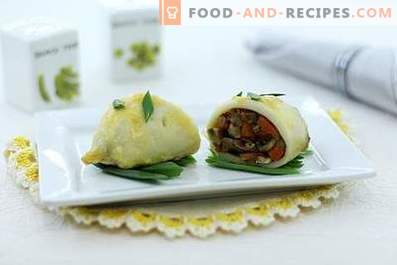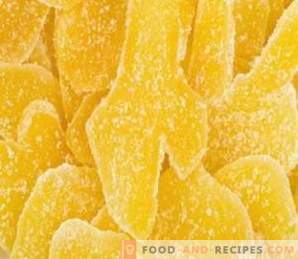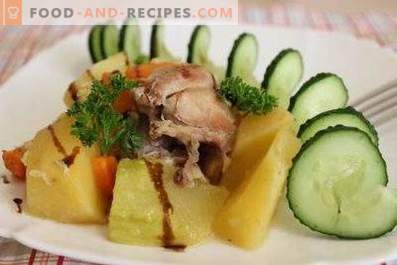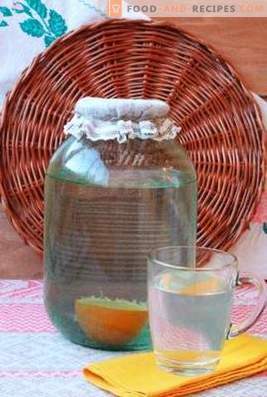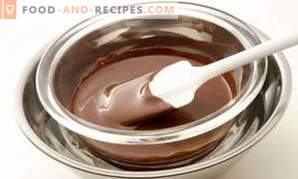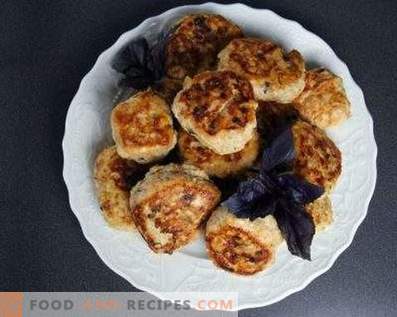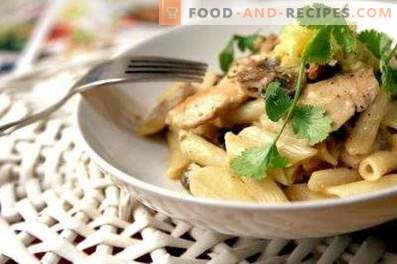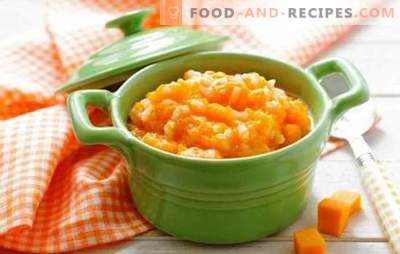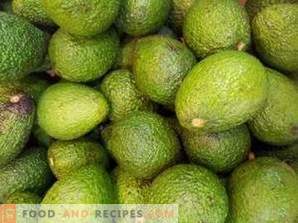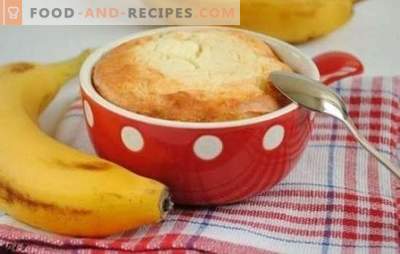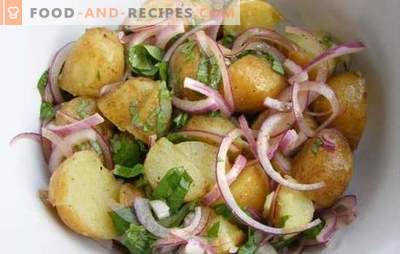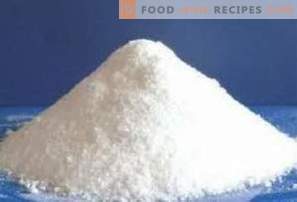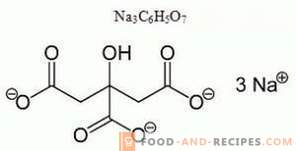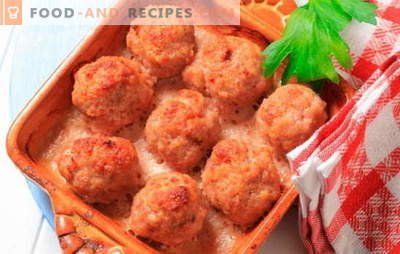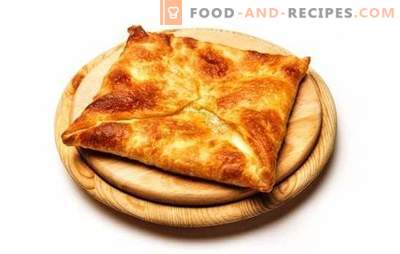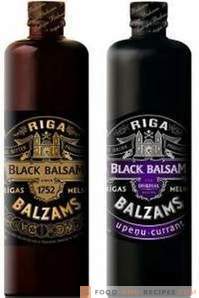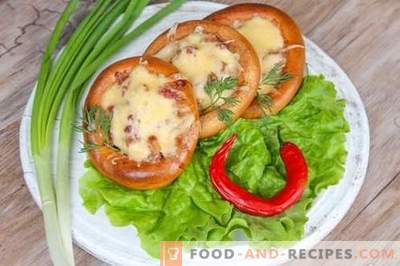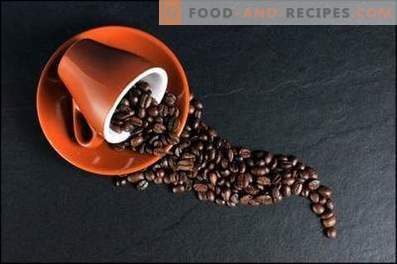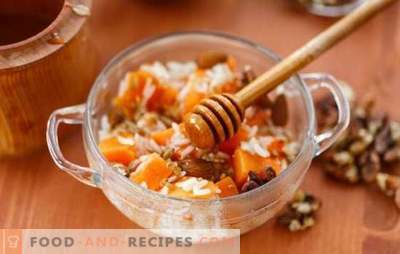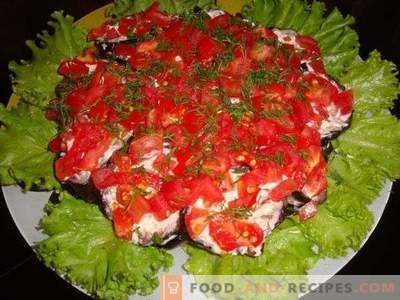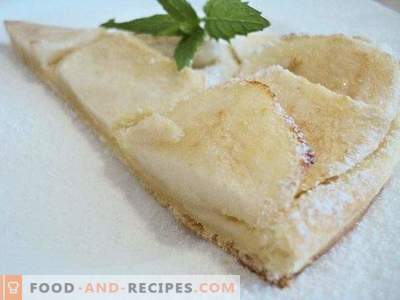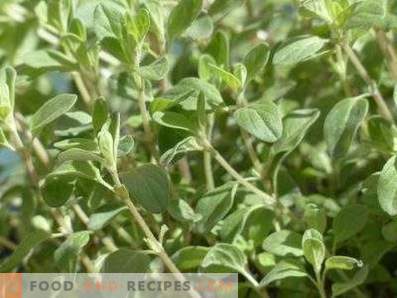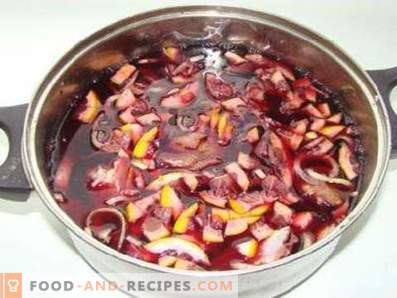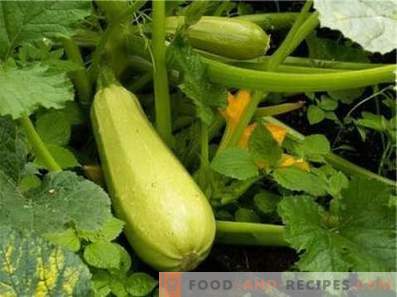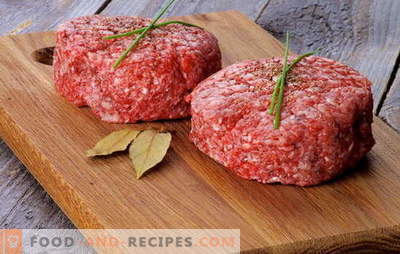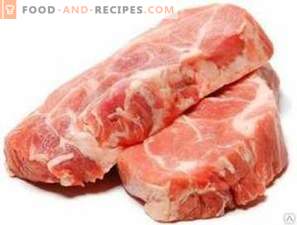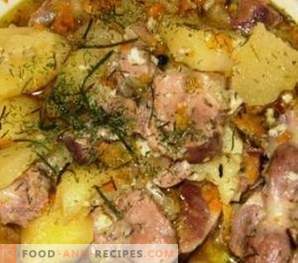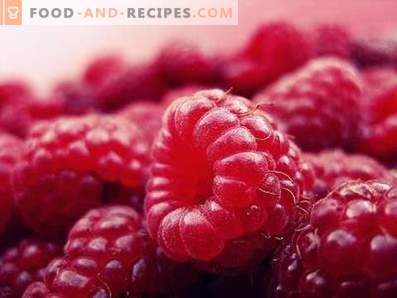
Raspberry is a widespread shrub of the family Pink. Researchers assume that Central Europe is the birthplace of this plant. At the same time, the first mentions of raspberry as a garden culture appeared in ancient Greek and Roman manuscripts dating back to the 3rd century BC. Over the past century, the plant has become widespread not only in European territories, but also in America, Asia, Africa, Australia. Today, the leading producers of the fruits of this crop are Russia, Serbia and the USA.
Raspberries have a perennial ligneous root with a multitude of adventitious processes that form a powerful branching root system. Biennial stems of the plant, covered with frequent small spines, reach 250 mm in height. The shoots of the first year of life are juicy, green with a bluish bloom. In the second year, the stems of wood and turn a light brown color.
The leaves of raspberry consist of 3-7 leaflets, having an ovoid shape. The top of the leaf blades is dark green, the bottom is greenish-gray with a silver tint, pubescent with fine hairs. The culture in the beginning of summer blooms with white flowers, gathered in small racemes. The fruit of the plant is a hairy drupe of bright pink, red or yellow color ripening in July-August.
Raspberries have a high nutritional value. In cooking, its fruits are used to make juices, jams, syrups, compotes, confectionery, fillings for baking, alcoholic beverages. Berries, flowers, roots and raspberry leaves are used in alternative medicine.
Nutritional value of raspberry and vitamins in its composition
Nutritional value 100 g raspberry:
- 0, 784 g of proteins;
- 0, 477 g of fat;
- 8, 231 g of carbohydrates;
- 1,476 g of organic acids;
- 8, 231 g of disaccharides, monosaccharides;
- 3, 693 g of dietary fiber;
- 84, 622 g of water;
- 0, 482 g of ash.
Vitamins per 100 g of raspberry:
- A, retinol equivalent - 32, 011 mkg;
- beta-carotene - 0, 193 mg;
- C, ascorbic acid - 24, 772 mg;
- B1, thiamine - 0, 018 mg;
- H, biotin - 1, 879 mkg;
- B2, riboflavin - 0, 047 mg;
- E, tocopherol equivalent - 0, 548 mg;
- B5, pantothenic acid - 0, 191 mg;
- PP, niacin equivalent - 0, 647 mg;
- B6, pyridoxine - 0, 067 mg;
- B9, folates - 5, 794 mkg.
Calories of raspberries
Caloric content of 100 g of fresh or frozen raspberry is 46, 512 kcal. One fruit of the plant (2 g) contains 0, 931 kcal, in a tablespoon of berries (15 g) - 6, 977 kcal, in a glass (145 g) - 67, 442 kcal.
The energy value of raspberry dishes is (kcal per 100 g):
- juice - 99, 213;
- puree - 49, 012;
- jam, jam - 271, 342;
- compote - 43, 106;
- syrup - 192, 403.
Calories raspberry wine - 70, 331 kcal per 100 g
Useful items in raspberry
Trace elements in raspberries (per 100 g):
- boron - 199, 073 µg;
- molybdenum - 14, 866 mkg;
- zinc - 0, 194 mg;
- manganese - 0, 209 mg;
- iron - 1, 188 mg;
- copper - 169, 448 mkg;
- fluorine - 2, 944 mcg;
- cobalt - 1, 957 mkg.
Macroelements in raspberries (per 100 g):
- potassium - 223, 609 mg;
- sulfur - 15, 791 mg;
- chlorine - 20, 761 mg;
- sodium - 9, 045 mg;
- magnesium - 21, 334 mg;
- phosphorus - 36, 722 mg;
- Calcium - 39, 804 mg.
Use of raspberry fruit
- Raspberry - a storehouse of useful elements, vitamins. The fruits of this plant help avoid vitamin deficiency, are considered an effective antiscorbutic agent.
- Raspberry compote perfectly quenches thirst during fever.
- The dried fruits of the plant are used to make antipyretic and diaphoretic drugs. 800 ml of boiling water are poured over a handful of berries, kept warm for 40 minutes and allowed to drink to the patient. After this sick person is covered with a warm blanket. The procedure is carried out every 3 hours until the symptoms of fever disappear.
- Raspberry dishes strengthen the immune system, strengthen the body's ability to resist infections.
- Raspberries are rich in iron, copper and other substances, without which the normal functioning of the blood and blood circulation systems is impossible. People suffering from anemia, it is useful to eat a handful of berries every day.
- In alternative medicine, the fruits of a plant are used to treat prostatitis. Men faced with the manifestations of this disease are advised to eat a glass of berries a day throughout the season.
- It has been proven that people who regularly consume raspberries recover faster after heavy loads (power, visual, mental, psychoemotional), protracted diseases. The compounds present in the fruit can significantly increase the physical endurance of athletes.
- The raspberry pulp contains substances that increase appetite, normalize the work of the intestines and stomach, alleviate pain in the digestive tract, and activate the secretion of digestive juices.
- Raspberry decoction has anti-emetic effect. For its preparation, a handful of fruits are boiled in 2 liters of water for 12-13 minutes. Ready drink drink without restrictions.
- Raspberry contains substances that remove excess cholesterol from the body, strengthen the myocardium and vascular walls, and regulate heart rhythm and blood pressure. Regularly including these berries in the diet, you can significantly reduce the risk of cardiac disorders or alleviate their symptoms.
- Fresh fruit helps to quickly bring a person into a state of intoxication.
- Useful compounds present in the raspberry pulp, have analgesic properties, help to cope with migraines, muscle and joint pain, manifestations of neuralgia.
- The fruits of raspberry are a natural antidepressant. Berries are recommended for people who are often experiencing stress, are in a depressed state, suffer from insomnia and other somnologicheskimi disorders.
- Raspberry has a positive effect on the reproductive system. When infertility, impaired potency or weakening the tone of the uterine muscles it is useful to eat half a glass of berries a day.
- The complex of antioxidant substances found in the composition of raspberry pulp actively fights aging of the body, minimizes the harmful effects of free radicals, reduces the risk of the appearance of malignant and benign neoplasms.
- The fruits of the plant contain a whole range of beneficial substances that are beneficial to the condition of the skin and its appendages. With regular consumption of berries improves the complexion, stop falling out and become shiny hair, gain extra strength nails.
Benefits of raspberry leaves
- Delicious and healthy fermented tea is made from raspberry leaves. Leaf plates spread in a thick layer in the shade, dried for 12 hours, poured into a deep bowl, thoroughly stirred with squeezing movements and crushed. The resulting raw materials are transferred to plastic or enameled containers, pressed with a yoke and kept at a temperature of 21-26 degrees for 6-8 hours. Darkened leaves are carefully dried in the oven at a temperature of 60 degrees and used as tea leaves for tea. The resulting drink is drunk without restriction on the amount of fever, weakening of the immune forces of the body, vitamin deficiency.
- A decoction of raspberry leaves has astringent properties. For its preparation 1 tbsp. l dried plant materials are poured with 1, 5 cups boiling water, boiled for 10 minutes and filtered. For diarrhea, take half a cup of medicine once an hour.
- Raspberry leaves contain a complex of substances with hemostatic properties. The infusion prepared from them (1 teaspoon per glass of boiling water) is drunk with gastric and other internal bleeding, used for washing wounds.
- Broth of raspberry leaves has anti-inflammatory properties. The medicine is used for rinsing the mouth in acute tonsillitis, pharyngitis, and dental diseases.
- Saturated raspberry leaf decoction is used in the treatment of acne, herpes and other dermatological diseases. For the preparation of medicines 3 tbsp. l raw materials are boiled for 20 minutes in a glass of water, infused for 50-55 minutes and filtered. Chilled means irrigate problem areas at least 2 times a day.
- Infusion of raspberry leaves has expectorant properties. The drug is prepared according to the following recipe: poured into a thermos 6 tsp. herbs and pour 700 ml of boiling water, infuse the mixture for 2 hours and filter the resulting liquid. Drink drink half a glass every 1, 5 hours.
Use of raspberry flowers
- Folk healers prepare an antidote for poisonous spider and snake bites from raspberry flowers. The glass is filled 1/5 with vegetable raw materials and 4/5 with medical alcohol. Mixture insist 25 days in the dark, filtered and poured into a bottle of dark brown glass. To improve the general condition with bites, take 30 drops of the obtained product three times a day.
- A decoction of crimson flowers helps to excrete toxic compounds, salts of heavy metals and other harmful substances from the body. In the preparation of medicines 1 tsp. Plant material is boiled in a glass of water for 10 minutes, filtered and cooled. Every 6 hours take 5 tbsp. l broth.
- A rich infusion of raspberry flowers is used in the treatment of acne. The glass is filled 1/3 with vegetable raw materials and 2/3 with boiling water, 1, 5 hours is insisted. The liquid is impregnated with a cotton pad and wipe the problem area with it 2-3 times a day.
- A decoction of raspberry flowers treat conjunctivitis and other inflammatory eye diseases. In a saucepan poured 3 tsp. flowers, pour 550 ml of water and boil the mixture for 5 minutes. The filtered and cooled liquid washes the eyes three times a day. In addition, on the basis of broth prepare cold lotions.
- Crimson flowers are used in the treatment of erysipelas of the skin. A rich broth is prepared from vegetable raw materials (3 tablespoons per half-liter of water) and every 4 hours irrigate a sore area to them.
- A weak infusion of raspberry flowers (1 tsp. Of raw materials for 2 cups of boiling water) helps to alleviate the symptoms of gynecological diseases. Drink drink a glass a day until the disappearance of signs of pathology.
Use of raspberry roots
- The roots of the plant are used to make a decoction that stops hemorrhoidal bleeding. A tablespoon of medicinal raw materials is poured with water (300 ml) and boiled for a quarter of an hour. The filtered liquid is drunk during the day.
- Infusion of crimson roots treat purulent otitis. To prepare the medicine, the rhizome is crushed, poured with boiling water (3 tablespoons per liter of water), infused for 2 hours and filtered. On the day of drinking a glass of infusion.
- A decoction of the roots of raspberry helps reduce the frequency of asthmatic attacks. The crushed rhizome (1 tablespoon) is poured into a saucepan with boiling water (1, 5 cups) and boiled on low heat for 8-10 minutes. The liquid is filtered through cheesecloth and drunk for the day.
Contraindications and harm to raspberries
- Raspberry is on the list of products that can provoke the development of allergic reactions - skin rash, sudden dizziness, etc. People who are prone to allergies to berries and fruits should limit or completely eliminate their consumption.
- It is forbidden to eat raspberries during exacerbations of gastritis, duodenal ulcers or stomach ulcers.
- Raspberries are rich in monosaccharides and disaccharides. Therefore, diabetics need to strictly limit the consumption of its fruits.
- Contraindications to the consumption of fresh raspberry fruit and dishes prepared on their basis are urolithiasis, nasal polyps, gout, osteochondrosis, bronchial asthma, and polyarthritis.
- It is forbidden to eat raspberries to people suffering from oxaluria, glomerulonephritis, nephritis.
- Raspberry is contraindicated for people suffering from high blood clotting and taking anticoagulants.
- Consumption of raspberries can cause harm to people suffering from amyloidosis (damage to internal organs, developing against the background of accumulations in the tissues of a specific protein-polysaccharide compound - amyloid).
- Nutritionists prohibit pregnant women from eating more than 3 tbsp. l raspberries a day. Violation of this prohibition is fraught with the development of allergy in the baby.


